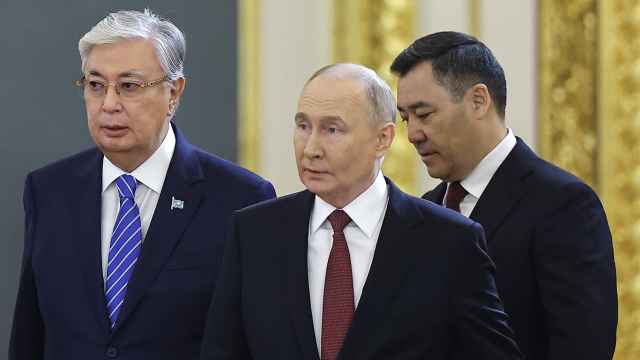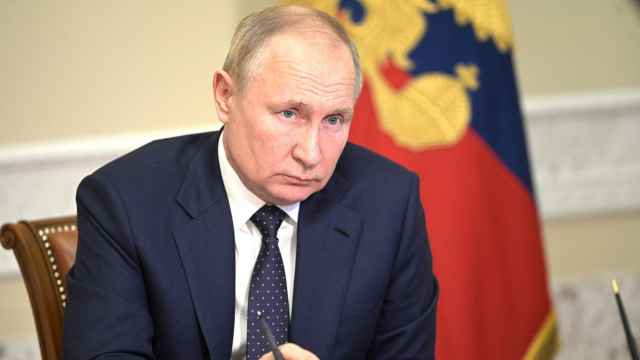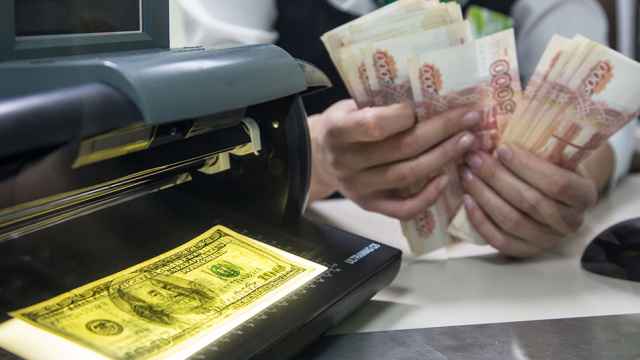Russia’s government is working on measures to stimulate use of alternatives to the dollar, as the Kremlin steps up efforts to cut dependence on the U.S. currency amid fears of new American sanctions.
“The government has no plans to give up dollar settlements, ban the circulation of the dollar or impose any other restrictions,” according to a statement from the cabinet’s press service published on official news agencies Wednesday. But the authorities are working on “the issue of reducing our economy’s dependence on the American currency, including through the creation of stimuli and mechanisms to shift foreign-trade settlements to national currencies.”
Russia has long struggled to limit its reliance on the dollar because of the relative stability of the U.S. currency and because Russia’s main commodity exports are traded globally in dollars. The greenback remains a popular asset for Russian savers, still wary of the ruble after several deep devaluations over the last two decades.
But as the U.S. Congress has pushed in recent months for further steps to punish Russia for alleged election meddling, fears have grown that major banks could be cut off from the U.S. financial system and the government has stepped up its efforts to develop alternatives.
Kostin Plan
Last month, Andrey Kostin, head of state-owned VTB Bank, announced his own plan for “de-dollarization.” It would take about five years and included increased usage of local currencies in international trade, re-registering major companies in Russia and using local financial infrastructure for Eurobond issues, he said.
The government said its efforts aren’t driven by any “personal initiatives” but “reflect the strategic line of the government.”
President Vladimir Putin supports the move to reduce reliance on the dollar, Kremlin spokesman Dmitry Peskov said Tuesday, but “this is a very complex process,” adding that “it can’t be quick and will take time.”
Russia has for years called for shifting more of its transactions with China and the European Union, its main trading partners, into yuan and euros, while operations with its former Soviet neighbors could be done in rubles. But progress has been slow.
‘Extra Costs’
“The ruble doesn’t have the same liquidity on the global market that other reserve currencies do and not everyone will want to shift to rubles because that means extra costs,” former Finance Minister Alexei Kudrin told reporters. “Countries with soft currencies such as the yuan may want to shift to payment in national currencies but I doubt the European Union will want to take payment from us in rubles.”
Dramatic progress on reducing reliance on the dollar will take at least 1.5-2 years, Deputy Finance Minister Alexey Moiseev said last month, though the government is trying to accelerate that, according to Tass.
“For some Russian companies it is natural, for example, metals companies who sell to Europe. But for most it is very tricky - oil is generally traded in dollars,” said Liza Ermolenko, an economist at Barclays Capital in London. “This is definitely not a trend internationally, as most struggle to see it as something viable.”
After the latest wave of new sanctions in the spring, Russia cut holdings of U.S. government debt by $81 billion, according to U.S. Treasury data. Even before that, the central bank had trimmed holdings of dollars to 44 percent of its reserves at the end of the first quarter from 46 percent three months earlier. Holdings of Chinese yuan rose to 5 percent from 3 percent.
A Message from The Moscow Times:
Dear readers,
We are facing unprecedented challenges. Russia's Prosecutor General's Office has designated The Moscow Times as an "undesirable" organization, criminalizing our work and putting our staff at risk of prosecution. This follows our earlier unjust labeling as a "foreign agent."
These actions are direct attempts to silence independent journalism in Russia. The authorities claim our work "discredits the decisions of the Russian leadership." We see things differently: we strive to provide accurate, unbiased reporting on Russia.
We, the journalists of The Moscow Times, refuse to be silenced. But to continue our work, we need your help.
Your support, no matter how small, makes a world of difference. If you can, please support us monthly starting from just $2. It's quick to set up, and every contribution makes a significant impact.
By supporting The Moscow Times, you're defending open, independent journalism in the face of repression. Thank you for standing with us.
Remind me later.






